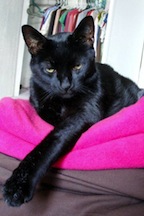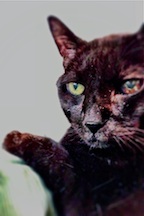Earlier this month, I noticed Sarah Silverman wrote "an obituary-type thing" about her dog Duck, her "constant companion," who just passed away. While I've always admired the comic's blend of intellectual and crude humor, politics and emotion, I now see her as a kind of role model for those who care for animals as they grow old and die. Plus, I've followed her career closely enough to understand how special Duck was.
Sarah got it right for those of us who've entered midlife without a spouse or children, and maybe also for those of us who deal with depression and loneliness, when she ended her short requiem with a list of descriptors: "My longest relationship. My only experience of maternal love. My constant companion. My best friend." And she did so without sounding crazy, something those of us with cat companions perhaps fear most of all.
Pedro, my own cat companion, howls. He howls every night and whenever I sit at my desk. He makes some regular cat noises, too, but my companion will be remembered for howling and for giving me a long, complex, dependent relationship -- maybe a bit like the one Sarah and Duck had.
Two years ago, Pedro and I were both prescribed melatonin. An over-the-counter sleep aid, melatonin does not require prescriptions, but two doctors suggested it. For me, a psychiatrist added it to medications for anxiety and major depressive disorder; for Pedro, a veterinarian added it to treatments for FIV (feline AIDS), anxiety, cardiomyopathy, hyperthyroidism, hypertension, a heart murmur and asthma. Fancy names aside, Pedro and I were each suffering from an inability to sleep, a fear of uncertain futures, and a crippling love for the other. So we kept each other alive and shared a bottle of melatonin tablets.
Now, with his addition of skin cancer and my continued depression, we've ditched melatonin for Bach Rescue Remedy. Still, we share the same problems, and we've also shared an apartment since 2007 -- first because no shelter in northeastern Connecticut welcomed FIV-positive cats, and then because I'd never move to Boston without him. Consequently, this kitty, named for my generation's favorite AIDS activist Pedro Zamora, joined me as a transient in a home, trying to make a life in this lonely world.
Initially, Pedro was simply plump, earning nicknames "Zen Cat" and "Meatball Head," as he played while barely moving and sat for hours simply staring. Pedro isn't like other cats; he doesn't stare, hide, hiss or sit on laps -- instead, always about a foot from me. That way I can reach over to rub his head and cheeks to provoke a purring, drooling ecstasy.

The first time my dad met Pedro, he stopped in the doorway and said, "That's not a cat. That's a goddamned panther." Even with his agreeable demeanor, Pedro commands a room with imposing claws; sleek black fur; golden eyes that stay focused in a serious, seductive stare; and formidable body.
By the end of our first year together, Dr. Groves diagnosed Pedro with asthma, as she handed me a Kleenex to catch tears over his accompanying heart murmur. Yet Pedro remained relatively healthy, though meatball-y. Once he had his daily inhaler, we implemented an exercise routine: We did stairs, and we did them quickly, diligently. I started jogging again, too, but running only made me feel lost. Pedro, however, thrived and lost six of his 18 pounds. I remember the congratulations Dr. Groves gave us both at our next appointment, but Pedro's success only highlighted my failures and emphasized that I, too, was turning into an indoor cat.
For years, the daily inhaler and Pedro's interest in pizza seemed our biggest troubles. In 2011, when he began howling at night, Dr. Groves gave Pedro new diagnoses of hyperthyroidism, cardiomyopathy, hypertension and anxiety, as well as an age twice what we thought. Old Man Pedro, evidently, was at least 13. And also getting fat again.
As Pedro gained new diagnoses, my old ones gathered steam and prompted me to find a new therapist. While Pedro cried, I explained to a psychologist named Marci that I was feeling disappointed with graduate school and realizing I'd entered my 30s without following my passions or making any of the right decisions. It all felt pointless, hopeless, worthless.
Our lives grew dominated by medication routines and weekly talks with Marci and Dr. Groves, who taught me to buy a stethoscope and monitor the little guy's heart rate. I, of course, fumbled with earpieces and iPhone stopwatches -- nowhere near as graceful as the Healer Groves, who simply closed her eyes to listen.
Marci has always listened, too, probably too often to tales of Pedro. "I'm going to take care of this stupid cat," I told her; she'd asked if caring for Pedro had become an excuse for isolation. "I don't think he's an excuse," I added. "He feels like my only purpose."
"So you're going to do for him what you wish someone would do for you," Marci said. "Is the cat a metaphor?"
At times, I do think Pedro's and my world stays small, and I'm not sure if loneliness is amplified by our situation, or if our situation is isolating. I suspect that if I were to die, the only one who'd notice my absence would be Pedro. Maybe I need him to stay alive; maybe he is my purpose.
Before moving back to Boston last year, Pedro developed skin cancer and iris melanosis, so as we said professional goodbyes to Dr. Groves, we found an oncologist and internist up the street from our new digs. We endured a full topical chemotherapy treatment in 2012, but this summer his second round was invasive enough, requiring a cone and T-shirt, that it forced us to consider quality of life. We stopped treatment and tried simply to be happy.

But we continue to spend our nights awake. His big eyes and strained voice evoke worry, which he must see reflected in my own; still, I work to make him purr and drool, calming him until the meowing routine starts again. "He's worried you're dead," Dr. Groves once told me with a smile. "It's sweet -- kind of romantic."
Exhausted, I read and write and watch movies online while he naps and howls. As much as I love our two-foot distance, my favorite times are when Pedro leans against my leg or arm. Sometimes, when the couch feels too lonely and when he's sitting across the room, I call him. "Come here, P."
I smile when he jogs, his step bouncy like the step of a cheerful older woman who carries heavy books. His gait has complex personality but physical restrictions. He doesn't really run.
Everyone has broached the idea of euthanasia, and I know death is coming -- just not quite yet. Though I can rationalize suicide, assisted or not, in humans, this situation with Pedro somehow is different. As far as anyone can tell, he feels no pain, he's happy, and his nighttime anxiety may be just that -- certainly not cause for pulling any plugs.
Pedro is not my father or husband or child, but I'm not going to give up on my constant companion simply because my life has grown smaller and more difficult.
Rationally, sleepless nights and medicated days aren't sustainable. But I didn't think rationally the other morning when Pedro came to me after eating, crying with worried eyes. There was no room for rationality when Pedro, who usually prefers space, lay down in front of me, relaxing only when I rubbed his cheeks -- my arm propped on a pillow -- until his chin drooped, his eyes closed, and he fell asleep with his head resting in my hand. Love is not rational; it is private and sometimes hard to sustain.
That is why, when a friend asked if I had someone lined up to accompany me to put Pedro down, I quickly said, "No." Of course not. The time won't be planned; it will be the only option. I'll probably think of how gently and warmly that "crude" comic Sarah Silverman described her last moments with Duck. But it'll be just Pedro and me who go to the hospital, and I'll let his meatball head rest in my hand as the two of us share that private moment, probably crying and drooling, and definitely feeling exhausted. On that day, Pedro hopefully will be left with some relief, and I'll be left.